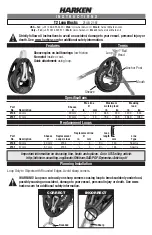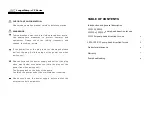
Chapter 3
Structured Cable Field Calibration and Testing
3-29
Troubleshooting Impedance Problems
Problem: High Impedance Readings
Probable Causes
Compression, stretching, or excessive bending damage to the
cable.
Defective connectors.
Insulation damage at a connector.
Ground loops created between cable shielding (if used) and
equipment grounding (via RS-232 cable to computer, or auxiliary
power).
Improperly chosen cables or patch cords.
Moisture in the cable.
Other Tests Affected
Test
Possible
Result
Length
Affected pairs will appear longer.
Average Impedance Change in average impedance is inversely
proportional
to
change
in
capacitance.
Delay and Skew Test
This test measures the period of time for a test signal applied to one end of a cable
run to reach the other end. Skew indicates the difference between the measured time
delay for that pair and the pair with the lowest value (displayed as 0.0 ns). Delay and
Skew limits are set according to the currently selected cable type.
Figure 3-19: Delay and Skew Test Screen
Delay and Skew Errors
Delay and skew measurements will usually differ slightly between pairs in the same
cable. A substantial difference indicates a cable installation problem or a pair defect.
Troubleshooting Delay and Skew Problems
Problem: Excessive Differences between Measurements
Probable Causes
Cables which use different materials for insulating the four pairs of
wires.
A break or short in the pair.
Excessive cable length.
Cable installation problems.
Other Tests Affected
Not Applicable
www.vemco.pl
















































